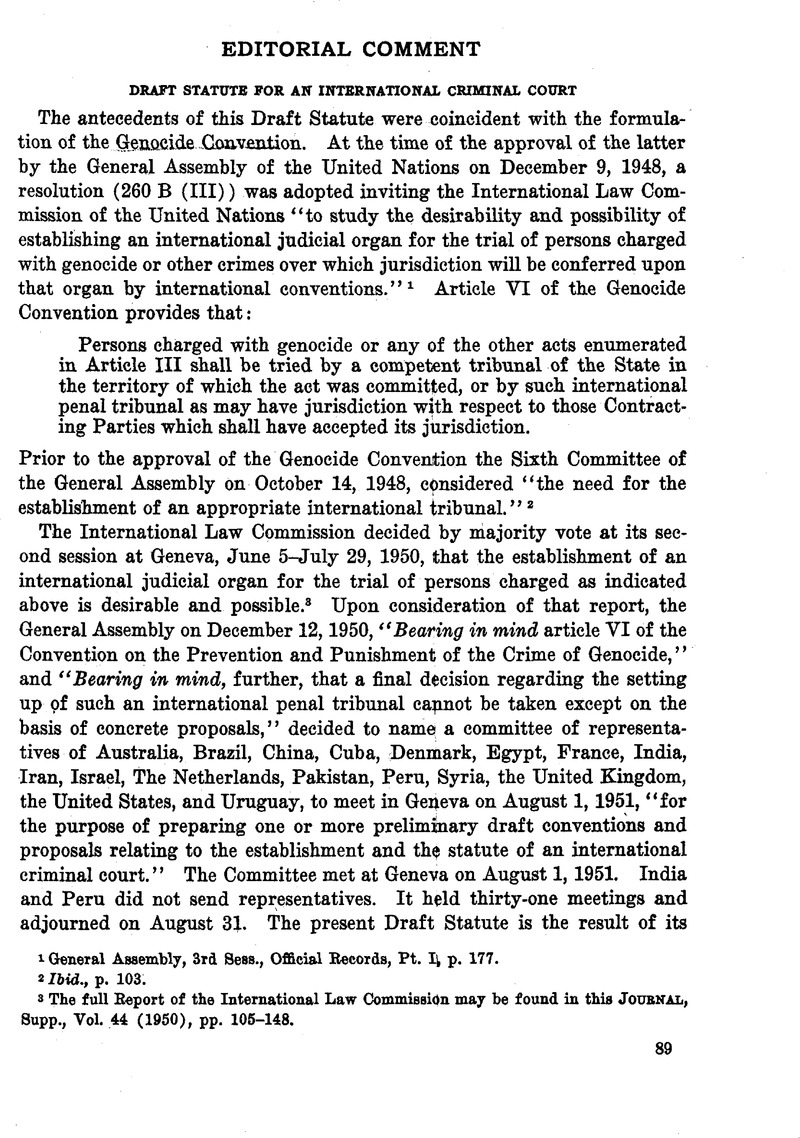Published online by Cambridge University Press: 20 April 2017

1 General Assembly, 3rd Sess., Official Records, Pt. I P. 177.
2 Ibid., p. 103.
3 The full Report of the International Law Commission may be found in this Journal, Supp., Vol. 44 (1950), pp. 105–148.
4 U. N. Doe. A/AC.48/4, Sept. 5, 1951.
5 Page 1, below.
6 The same procedure would apply to the election of the nine judges (Art. 11), the filling of vacancies (Art. 19), the election of a Committing Authority of nine members to act as a sort of grand jury (Art. 33), and of a panel of ten persons who in turn would elect the Prosecuting Attorney (Art. 34). The Prosecuting Attorney draws up the indictment based on the findings certified by the Committing Authority.
7 Conventions for the Prevention and Punishment of Terrorism and for the Creation of an International Criminal Court for the trial and punishment of such crimes were signed at Geneva on Nov. 16, 1937. Twenty-four Members of the League of Nations signed the first-mentioned convention, but only the following thirteen signed the latter: Belgium, Bulgaria, Cuba, Czechoslovakia, Prance, Greece, Monaco, The Netherlands, Rumania, Spain, Turkey, the U.S.S.R., and Yugoslavia. Neither convention went into effect because of failure of ratifications. For their texts, see Hudson, International Legis lation, Vol. VII, pp. 862 and 878. Five regular judges and five deputy judges were to have been appointed by the International Court of Justice at The Hague, and the. parties were to have the choice of prosecution by national courts or before the proposed International Criminal Court.
8 The text of the Draft Code is printed in this Journal, Supp., Vol. 45 (1951), pp. 126–132. It is the subject of separate comment, infra, pp. 98–102. The above quotation is from the International Law Commission’s second report, ibid., Supp., Vol. 44 (1950), p. 138.
9 See Harvard Research in International Law, study entitled “Jurisdiction with Respect to Crime,” where it is stated that the principle o%,territorial jurisdiction “is basic in Anglo-American jurisprudence, and is incorporated in all modern codes.” Citations are given to the national codes of fifty-seven countries. This Journal, Supp., Vol. 29 (1935), pp. 481–482.
10 It has been suggested that thq surrender of fugitives for trial in foreign countries amounts to a waiver by the United States Government of the right of trial by jury and similar constitutional guarantees. This argument is based upon a misunderstanding of the doctrine of ths. territoriality, of crime. The United States cannot claim for its citizens who commit crimes abroad and are returned there for trial the constitutional guarantees that would have been available had the crimes been committed and the trial conducted in the United States. A fair trial according to the lex loci is all that is required, unless that standard of justice is so inferior measured by generally accepted standards that there exists what international law considers a “denial of justice.”
11 United States v. Smith, 173 Fed. 227.
12 Ex parte Milligan (1866), 170 U. S. 343.
13 The Charter states that the Tribunal was established “for the just and prompt punishment of the major war criminals of the European Axis.” Dept. of State Bulletin, Vol. XIII, p. 222.
14 Judgment of the International Military Tribunal at Nuremberg, Oct. 1, 1946; this Journal, Vol. 41 (1947), p. 172 at p. 249.
15 Ex parte Milligan (1866), 170 U. 8. 343. In the ease of the German Saboteurs (Ex parte Quirin), convicted by a Military Commission in the Military District of Washington in 1942, the Supreme Court on appeal held that the decison in Ex parte Milligan did not apply because Milligan was not an enemy, was not a member of the armed forces, and was not charged with an offense against the laws of war. Said Chief Justice Stone: “I t has never been suggested … that an alien spy, in time of war, could not be tried by military tribunal without a jury.” (1942) 317 U. S. 1; printed in this Journal, Vol. 37 (1943), p 152.
16 Fisher, Brown & Co. v. Fielding, 67 Conn. 91, 32 L.R.A. 236.
17 The New York Times, Dec. 20, 1951, p. 1.